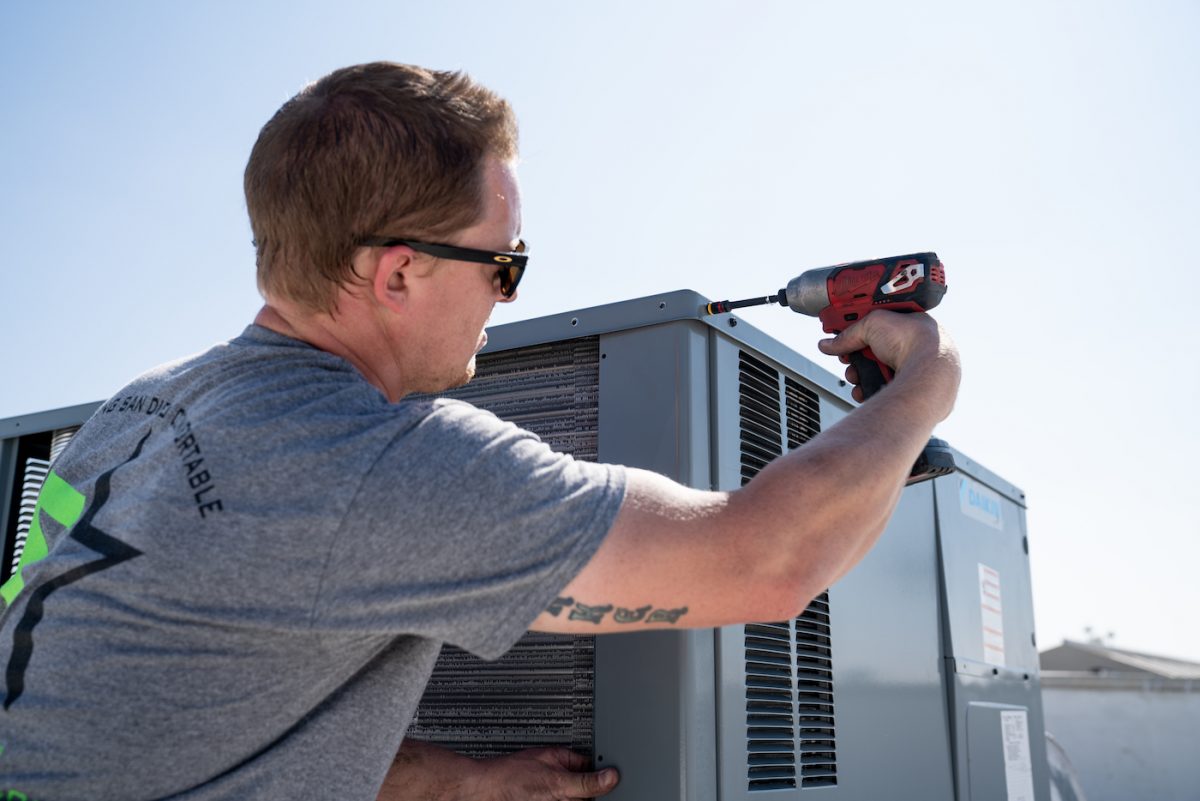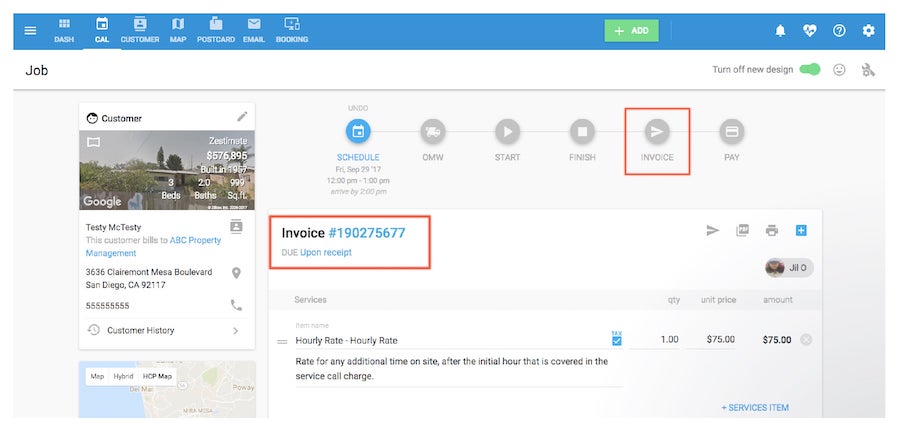
Running every aspect of your HVAC business is a tall order. The busier you get with new clients and jobs, the less time you have to focus on paperwork, unless you are using HVAC invoicing software of course.
So, it’s not surprising that some of the administrative stuff like invoicing might fall through the cracks.
Mistakes to avoid when submitting an HVAC invoice
Fortunately, HVAC invoicing doesn’t have to be complicated. We put together this list of common mistakes to avoid – so you can get paid faster, cut back on paperwork, and make invoicing a breeze.
Mistake #1: Not generating an invoice on-site
Are you slowing down the payment process by mailing your customers paper invoices? One of the biggest invoicing mistakes HVAC professionals make is not giving customers an invoice before they leave the job site.
If you can generate an invoice right then and there, there’s no need to mail one out after the fact. This saves you money on stamps, envelopes, and ink – and helps you bill more accurately since there’s more room for clerical error once you leave the job site.
Plus, showing the customer your invoice before you leave their property ensures that there are no surprises in store for either party. The customer can confirm that they understand the charges and you can clarify when payment is due and how they can pay.
Furthermore, it allows you to get paid on-site through your home services app – that is, as long as you’re not making this next mistake.
Mistake #2: Turning down credit cards
The number one rule of HVAC invoicing? Don’t make it hard for people to pay you. Unfortunately, some HVAC professionals break this rule by not accepting credit cards. The thing is, there’s really no good reason to turn down credit card payments these days.
By refusing to take credit card payments, you’re creating an unnecessary roadblock between you and your payday. Especially because, with a smartphone in your pocket, you can easily collect payments on-site. Your home service business software can turn your phone into a card reader on-demand. The HouseCall Pro app helps you get paid on-site by scanning a customer’s card on the spot.
No more chasing down payments after the fact, pestering customers with follow-up emails, or driving around picking up checks. This frees you up to spend more time working on other billable jobs or, better yet, generating new opportunities for your business.
Mistake #3: Not being prepared for cash payments
Even though we just talked about how amazingly convenient online payments are for you and your customers, why limit yourself to one payment method? While many of your customers will love that you accept credit cards, some might insist on paying cash.
HVAC professionals serve a wide range of demographics – which means you should still be willing to accept cash from any customers who prefer it. So, for the convenience of everyone involved, make sure your technicians always have enough change on them to break a bill.
Mistake #4: A poorly organized filing system
This goes for both paper and digital invoices. If you don’t properly label and organize your invoices, you’ll have a hard time keeping track of all your sales, payments, and customer information.
Ideally, you should use field service invoicing software that organizes customer data all in one place, including invoices and payments.
This gets even more important as your business grows because not only do you have more jobs and invoices to keep track of, but you’ll also have more employees creating, sending, and following up on invoices.
Mistake #5: storing outdated customer data
You should save customer details in your home services or billing software so it’s easy to generate a new invoice.
When you land a new customer, collect and verify their contact information before putting together their first invoice. This should include the customer’s full name, home address, phone number, and email address (so you can send them a copy of their receipt).
For repeat customers, you should ensure their data is up-to-date when they call to book their next appointment. To streamline your billing practices even further, securely store your customers’ payment information on your home services app. This way, you can process the payment as soon as they review the invoice.
Because hey, if you have an opportunity to make billing easier for your customers and get paid faster, why not take it?
Mistake #6: incomplete maintenance records
Your invoicing process should involve taking notes about the work that was done, including when the job was completed, how long it took, what parts were used, and any relevant details. If your maintenance records are missing data, you risk running into trouble down the road.
These records allow you to include a list of goods and services rendered on your invoice. Otherwise, the customer may be confused about where certain costs are coming from. For instance, if something unusual comes up during a routine installation, you want to have a record of it in case the customer questions the extra charges.
Mistake #7: not including a detailed cost breakdown
On top of getting you paid, an invoice ensures the customer understands exactly what they’re paying for. That’s why it’s helpful to include a detailed breakdown of individual costs as well as the subtotal and the total after tax (if applicable).
For instance, say you offer 10% off for first-time customers. That 10% discount needs to be represented as a line item on your invoice. Otherwise, the customer might not realize a discount was applied and expect the same lower rate on future work.
Mistake #8: inconsistent documentation
If your team is any bigger than just you, then you need to lay down some guidelines for documentation. Make sure your techs understand what needs to be included on their invoices, how much detail you require for each line item, and how specific types of work need to be recorded.
If you include any acronyms or short forms on your invoices, you should aim to use them consistently. Every invoice should follow the same template and guidelines, regardless of which technician completed the job.
Mistake #9: Missing any of these crucial HVAC invoice elements
It’s important that you’re able to keep track of your invoices – and these key details will help you do so. Here are four main elements every invoice needs to have:
- A clear header:Include a header with the word ‘Invoice’ displayed prominently. This might sound obvious, but it’s important to ensure your customers can instantly tell exactly what they’re looking at.
- Contact information:Include your business name and contact information on every invoice, as well as the customer’s name and contact details.
- Date issued:This is valuable for record keeping and accounting purposes as well as making sure you get paid on time.
- Invoice number:Every invoice should have a unique number or billing code.
Mistake #10: skipping over the legal stuff
An invoice is a record of services provided, but it can also act as an agreement between your business and the customer.
For instance, if you have specific payments terms you want customers to agree, it’s important to outline those on the invoice itself. This might include how long they have to pay the bill and accepted payment methods, along with any other preferences you might have.
In this case, you should also include a spot for the customer’s signature.
Mistake #11: Not offering a service contract to secure future work
With the right approach, an invoice can do more than get you paid for the current job – it can help you secure future cash flow, too.
By allowing customers to opt into a service agreement right on the invoice, you can increase your revenue with repeat business. Consider offering a service contract as an optional add-on and make it possible to add that cost directly to the invoice.
If you want to learn more about the value of service contracts, keep an eye out for our upcoming article on this very topic!




